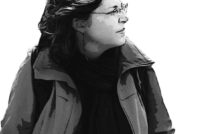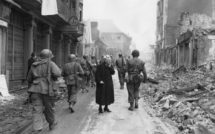

This is part of our special feature Memory and the Politics of the Past: New Research and Innovation.
At the inaugural Memory Studies Association conference this past December, we led a workshop to explore pedagogical issues regarding the teaching of memory, especially in the humanities and social sciences, but also arts and design. Teaching plays a key role in shaping memory studies however one wishes to approach it as a field—whether as an emerging discipline, inter-discipline, or even anti-discipline. Pedagogy, of course, is one of the main vectors of scholarly reproduction, and we were curious to start a discussion about what the practice of memory studies looks like in the classroom.
The question of teaching memory extends beyond the question of competing canons from those disciplines for whom memory tends to be a discrete object of study, such as psychology, literature, sociology, and history (though of course not limited to these). Following the spirit of the conference, we were interested in thinking about the teaching of memory from within and across such disciplines, and what it would mean to create interdisciplinary sub-fields, such as minors, majors, certificates, or masters programs in Memory Studies. Could the future even see departments of Memory Studies?
The workshop began with two observations: First, from many of our own experiences we see a growing demand from students for courses dealing with memory. Nonetheless, student motivations for choosing such courses are not necessarily driven by a desire to learn about memory as a theoretical concept, rather their interest may often lie in the (national) empirical context in which we embed the teaching of memory. This is linked in part to the nature of memory studies as a multidisciplinary field and can lead to challenges and tensions in the design of syllabi. The (lack of) disciplinary boundaries also leads to the risk of dilettantism where a method or approach drawn from outside of one’s primary field of study is being taught and studied and as such needs to be carefully managed.
Second, beyond the question of creating content for students, there is a need for a more defined community of practice to play a stronger role in evaluating faculty who teach within memory studies, broadly conceived. There is an increasing number of interdisciplinary departments (the so-called “Studies” departments) where scholars who focus on memory will be evaluated for tenure and promotion, and who need to draw on letters from a broad scholarly community. An overall strengthening of the pedagogical knowledge base, we submit, would help both in responding to student demand and faculty mentoring, promotion, and engagement. There are also national differences in the perception of memory studies as a field, making an international society such as the CES network on Transnational Memory and Identity in Europe and the MSA an ideal forum for exchanging experiences and strategies in this regard.
At a practical level, our workshop discussions concerned the pedagogical challenges of different formats (seminar, lecture, project and studio) as well as different student audiences. Teaching about cultural and social memory can be a very fraught undertaking, because memory studies also always engages students’ own emotions, for example concerning their personal memory of traumatic events either as witnesses, participants, as inheritors of family memories, or as interpellated subjects of national and other memory discourses with strong holds on their identities. This becomes a pedagogical challenge to address the different scales of implication and make productive use of what students bring to the class from their own experiences, while also doing justice to the instructor’s positionality. The teaching of memory studies topics is always deeply political. As pedagogues, we would always aim to teach critical thought and engagement, and we may wish our students to take what they learn outside of the classroom. The teaching of contemporary memory-related topics can thus afford unique opportunities to encourage political activism and social engagement.
As workshop leaders, we posed a series of deceptively simple questions to get a sense of the diversity of pedagogical approaches. For example, we asked participants whether they defined memory in their classes, and if so, how. The responses to this question ranged from the expository (“dealing with the past, where the past is a problem”) to the embodied (“memory is not just in your head, but in your body”) to the procedural (“start with concrete cases and let the cases drive the choice of theory, not the other way around”). We asked who their students were, and this led to a discussion on elite versus non-elite universities, and on differences between students who need to be coaxed into seeing through the lens of “memory” and students for whom memory is too affectively acute to serve as an analytic. We asked how to approach theory, and what should be the balance between theory and empirical material? This led to questions about whether participants thought there was a canon, and the response was usually yes, though what counted for the canon veered far from the sociological and history mainstays of Maurice Halbwachs and Pierre Nora to stretch from Freud to Fanon, from Toni Morrison to Derrida, from Paul Ricoeur to Lisa Maalki, from Augustine’s Confessions to Jan and Aleida Assmann, to recent works by Michael Rothberg, Jeffrey Olick, and Marianne Hirsch.
A recurring point of discussion was the Eurocentric focus in memory studies, especially within works identified as candidates for the canon. This reflects both the origins of the “discipline” (as such) in largely European responses to First and Second World Wars, and these texts’ reliance on Western philosophical and psychoanalytic traditions. Participants readily agreed that this focus has expanded today, especially to include the memory of empire and colonialism, though it remains a challenge for memory studies to effectively de-colonize. It remains especially problematic to teach postcolonial memory predominantly through the lens of theories developed in the scientific traditions of the former colonial powers. It is in response to this challenge that some of the most exciting areas of memory studies are to be found today, as the traditional focus on national memory formation shifts to studying memory scattered beyond national borders through trade, war, slavery, colonialism, and migration, and memory moving between generations. This leads to new epistemological and empirical questions about memory that opens the field quite wide. One participant uses climate change in her class as an example of different temporalities of memory—raising the question: how does the earth remember? Others raised questions of how to connect memory to an increasing body of work on materiality and on animals.
While the substantive discussions covered a wide territory, there was general consensus that a more consistent effort at sharing syllabi, assignments, results, practices and experiences would provide a firmer foundation for memory studies in all its forms as this field comes into its own. This then, is where we hope to turn next, to create such initiatives as a syllabi collection process, an archive of class projects, and other resources to facilitate a growing community of practice around this mercurial yet vital and vibrant area of study.
Jonathan Bach is Associate Professor and chair of the interdisciplinary Global Studies undergraduate program at The New School in New York. His work looks at social transformation in Germany and China with a focus on questions of memory, material culture, urban change, and space and identity. He is the author of What Remains: Everyday Encounters with the Socialist Past in Germany (Columbia University Press, 2017), co-editor of Learning from Shenzhen: China’s Post-Mao Experiment from Special Zone to Model City (University of Chicago Press, 2017) and author of Between Sovereignty and Integration: German Foreign Policy and National Identity after 1989 (St. Martin’s Press). He served as the co-chair of the German Studies Association Interdisciplinary Memory Studies Network from 2013-16.
Sara Jones is a Senior Lecturer at the University of Birmingham. Her research focuses on European cultural and political memory, particularly of post-socialism. She is author of two monographs: Complicity, Censorship and Criticism: Negotiating Space in the GDR Literary Sphere (Berlin: de Gruyter, 2011) and The Media of Testimony: Remembering the East German Stasi in the Berlin Republic (Basingstoke: Palgrave, 2014).
The Memory Studies Association conference is funded by the Council for European Studies (CES).
This article by Jonathan Bach and Sara Jones is part of our special feature Memory and the Politics of the Past: New Research and Innovation.
Read Jonathan Bach’s syllabus for Migration of Memory here.
Photo: Black and white retro image of Lancaster bombers from Battle of Britain in World War Two, Matt Gibson | Shutterstock
Published on April 4, 2017.




